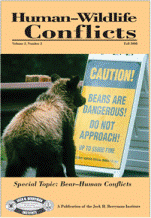Center, Internet, Wildlife Damage Management

Human–Wildlife Interactions
Date of this Version
Spring 2009
Document Type
Article
Abstract
Invasive alien species (IAS) threaten global biodiversity; they are the major cause of species extinction on offshore islands. Management of IAS requires data on the ecology of species in their new environment, how these species respond to management, and how these processes interact. Often, however, there is a paucity of information on key biological parameters that are critical to making management decisions. We sent a questionnaire to professionals and organizations managing invasive species and asked the respondents to prioritize a list of information they required to carry out eradication of invasive species. We analysed responses to assess the level of agreement among experts. Then, we compared them to a survey ranking available information in the peer-reviewed literature. We did this for 8 globally-important mammal species to identify gaps in available knowledge. We suggest that many of the shortfalls in knowledge can be best addressed through adaptive resource management (i.e., collecting data during the process of carrying out eradication itself, analyzing and processing these data, and using the information to make objective decisions that can be fed back into field operations). We recommend a modelling approach to enable the forecasting and testing of different scenarios when manipulative experimentation is impossible. As this process evolves, it should assist successful eradication of IAS on larger islands.


Comments
Published in Human–Wildlife Conflicts 3(1):30–40, Spring 2009. Published and copyright by Jack H. Berryman Institute http://www.berrymaninstitute.org/journal/index.html